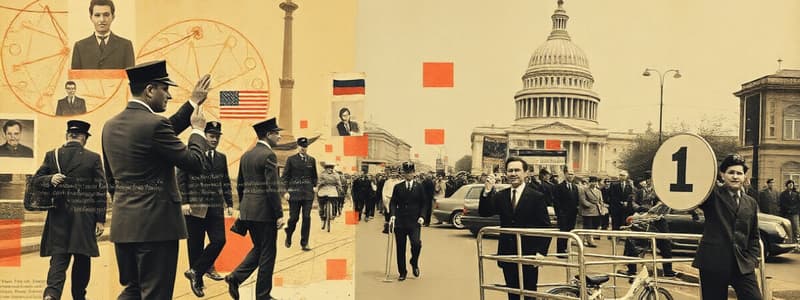Podcast
Questions and Answers
What does cultural change specifically refer to?
What does cultural change specifically refer to?
- The process of borrowing cultural traits from one society to another
- Changes in material and non-material cultural elements (correct)
- Shifts in political structures and governance
- Alterations in social relationships among people in groups
Which of the following best describes diffusion?
Which of the following best describes diffusion?
- The creation of new cultural elements
- The process of improving existing cultural elements
- The transmission of cultural traits from one society to another (correct)
- Changes in personal beliefs and ideologies
According to MacIver and Page, how is social change different from cultural change?
According to MacIver and Page, how is social change different from cultural change?
- Cultural change is unrelated to social institutions.
- Social change exclusively deals with personal relationships.
- Social change does not include technological advancements.
- Cultural change encompasses a broader spectrum, including various elements of culture. (correct)
What mechanism of change is exemplified by the advent of the Internet?
What mechanism of change is exemplified by the advent of the Internet?
Which statement accurately describes social change?
Which statement accurately describes social change?
What can be considered an example of discovery in the context of cultural change?
What can be considered an example of discovery in the context of cultural change?
Which of the following statements is NOT true about cultural change?
Which of the following statements is NOT true about cultural change?
Which mechanism of change is primarily illustrated by the spread of cultural traits due to migration?
Which mechanism of change is primarily illustrated by the spread of cultural traits due to migration?
What does ethnocentrism involve?
What does ethnocentrism involve?
How do the American and Muslim women illustrate cultural perspectives?
How do the American and Muslim women illustrate cultural perspectives?
What is the main characteristic of cultural relativism?
What is the main characteristic of cultural relativism?
What misconception might an ethnocentric person hold regarding racial discrimination?
What misconception might an ethnocentric person hold regarding racial discrimination?
What reaction contrasts with ethnocentrism in the examples given?
What reaction contrasts with ethnocentrism in the examples given?
What is a negative outcome of ethnocentrism?
What is a negative outcome of ethnocentrism?
Why is cultural relativism important in today's society?
Why is cultural relativism important in today's society?
What viewpoint would a cultural relativist most likely hold regarding clothing choices?
What viewpoint would a cultural relativist most likely hold regarding clothing choices?
What principle does cultural relativism emphasize regarding understanding individuals' beliefs?
What principle does cultural relativism emphasize regarding understanding individuals' beliefs?
What major contrast does ethnocentrism have with cultural relativism?
What major contrast does ethnocentrism have with cultural relativism?
How did Franz Boas contribute to the concept of cultural relativism?
How did Franz Boas contribute to the concept of cultural relativism?
What does cultural relativism suggest about moral standards across different societies?
What does cultural relativism suggest about moral standards across different societies?
Which of the following statements accurately reflects ethnocentrism?
Which of the following statements accurately reflects ethnocentrism?
Why is cultural relativism important in anthropological research?
Why is cultural relativism important in anthropological research?
In what way does cultural relativism challenge common perceptions of morality?
In what way does cultural relativism challenge common perceptions of morality?
According to the views of William G. Sumner, what does ethnocentrism often lead to?
According to the views of William G. Sumner, what does ethnocentrism often lead to?
What is the main effect of cultural relativism in relation to ethnocentrism?
What is the main effect of cultural relativism in relation to ethnocentrism?
Which of the following best describes cultural relativism?
Which of the following best describes cultural relativism?
What is essential for grasping the concept of cultural relativism?
What is essential for grasping the concept of cultural relativism?
Cultural relativism asserts that there is no culture superior to another regarding which aspects?
Cultural relativism asserts that there is no culture superior to another regarding which aspects?
When encountering cultural practices different from one's own, what does cultural relativism advocate?
When encountering cultural practices different from one's own, what does cultural relativism advocate?
Which of the following is NOT a requirement for practicing cultural relativism?
Which of the following is NOT a requirement for practicing cultural relativism?
How does cultural relativism relate to the understanding of beauty and morality?
How does cultural relativism relate to the understanding of beauty and morality?
What mindset is required for effectively applying cultural relativism?
What mindset is required for effectively applying cultural relativism?
What is the primary difference between social change and cultural change?
What is the primary difference between social change and cultural change?
What can significantly influence communication in modern society?
What can significantly influence communication in modern society?
What characterizes political change?
What characterizes political change?
According to early writers, what is one misconception about social and cultural change?
According to early writers, what is one misconception about social and cultural change?
Which factor does NOT contribute to social change according to Gillin and Gillin?
Which factor does NOT contribute to social change according to Gillin and Gillin?
How can changes in communication methods impact individual relationships?
How can changes in communication methods impact individual relationships?
What type of governance is classified as political change?
What type of governance is classified as political change?
Which of the following best describes cultural change?
Which of the following best describes cultural change?
Study Notes
Social, Cultural, and Political Change
- Social Change: Refers to transformations in social institutions over time.
- Cultural Change: Involves transformations in lifestyle, beliefs, and practices of a population.
- Communication Evolution: Advances in communication technology enhance information exchange but may lead to weaker personal connections.
- Political Change: Occurs when there is a shift in power or governance style (e.g., democracy to monarchy).
- Debate on Terminology: Social change and cultural change are often used interchangeably; however, some scholars distinguish them based on their social and cultural implications.
- Cultural Change Defined: Encompasses all changes in culture, including technology, art, ideology, and social norms.
Mechanisms of Change
- Diffusion: Cultural traits spread from one society to another through various means, such as migration and globalization.
- Invention: Creation of new cultural elements to address social challenges (e.g., the Internet).
- Discovery: Recognition of existing elements or knowledge, enhancing understanding of surroundings (e.g., scientific research).
Cultural Relativism
- Definition: The principle that a person’s beliefs should be understood based on their own culture rather than judged against another culture.
- Historical Context: Established by Franz Boas and recognized in anthropological research for appreciating cultural diversity.
Ethnocentrism
- Definition: The evaluation of other cultures based on the standards of one’s own culture, often leading to bias or superiority claims.
- Examples of Ethnocentric Behavior: Misinterpretation of clothing norms, such as comparing Western styles to conservative attire from other cultures.
- Impact on Understanding: Leads to stereotypes and discrimination, as seen in racial bias against individuals based on skin color.
Bridging Cultural Understanding
- Mitigating Ethnocentrism: Recognizing that cultural perspectives shape definitions of morality, beauty, and social norms; embracing cultural relativism can reduce biases.
- Value of Open-Mindedness: Cultivating respect for diverse cultural practices promotes empathy and dismantles stereotypes.
- Education and Exposure: Engaging in cultural exchange programs fosters appreciation for the uniqueness and richness of various cultures.
Conclusion
- Cultural Perspective: No single culture should be deemed superior; understanding cultural differences requires an unbiased and educated outlook.
- Cultural Relativism's Role: Essential for fostering mutual respect and understanding in a diverse world.
Studying That Suits You
Use AI to generate personalized quizzes and flashcards to suit your learning preferences.
Related Documents
Description
This quiz explores the transformations in social, cultural, and political contexts throughout different educational stages. Participants will describe their personal changes from elementary to Senior High School and analyze the significance of those changes. Dive into examples of social and cultural shifts and reflect on their implications.




